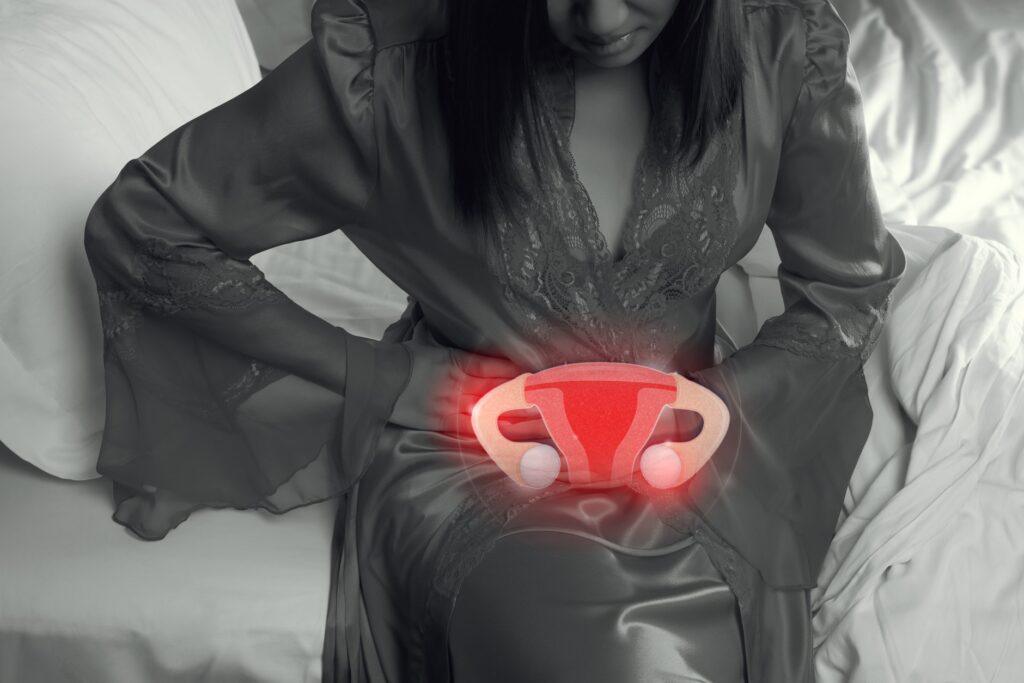Introduction
Endometriosis is a health condition that affects many women. It happens when tissue, similar to the lining inside the uterus, grows outside of it. This tissue can cause pain, heavy periods, and other problems. Although endometriosis can be challenging, there are ways to manage it. In this blog, you will learn about endometriosis symptoms, diagnosis, and treatment options. Understanding this condition can help you find relief and improve your quality of life.
What is Endometriosis?
Endometriosis is a long-term condition. In this condition, tissue like the lining of the uterus grows in other places, such as the ovaries, fallopian tubes, or pelvis. Because this tissue acts like normal uterine lining, it thickens and bleeds during each period. However, the blood has nowhere to go. As a result, this can cause pain, swelling, and sometimes scar tissue. According to the World Health Organization (WHO), endometriosis affects about 10% of women of childbearing age worldwide.
Common Symptoms of Endometriosis
Symptoms of endometriosis can vary from person to person. Some women have mild symptoms, while others have severe pain. However, many women with endometriosis experience:Painful periods (cramps that may get worse over time)Pain during or after sexPain with bowel movements or urination, especially during periodsHeavy menstrual bleeding or bleeding between periodsFatigue or feeling very tiredDifficulty getting pregnant (infertility)
Sometimes, endometriosis pain relief can be hard to find. But with the right care, symptoms can improve.
Causes and Risk Factors
The exact cause of endometriosis is not fully known. However, several factors may increase the risk:Family history of endometriosisStarting periods at an early ageShort menstrual cycles (less than 27 days)Heavy periods that last more than seven daysNever giving birth
Although these factors may raise your risk, anyone with periods can develop endometriosis. Researchers are still studying why this condition happens.
How Endometriosis is Diagnosed
Diagnosing endometriosis can take time. Many women wait years before getting a diagnosis. If you have symptoms, your doctor will ask about your medical history and do a physical exam. Sometimes, they may suggest tests such as:Ultrasound: This uses sound waves to look for cysts or growths.MRI: This scan gives detailed images of your organs.Laparoscopy: This is a minor surgery where a small camera looks inside your belly. It is the only way to confirm endometriosis.
Because the endometriosis diagnosis process can be complex, it is important to talk openly with your doctor about your symptoms.
Treatment Options for Endometriosis
Treatment for endometriosis depends on your symptoms and if you want to have children. Options include:Pain relief: Over-the-counter medicines like ibuprofen can help reduce pain.Hormone therapy: Birth control pills or hormone shots can slow the growth of endometriosis tissue.Surgery: In some cases, doctors remove endometriosis tissue to ease pain or improve fertility.Other treatments: Some women try physical therapy or acupuncture for extra relief.
Although there is no cure, many women find that the right treatment for endometriosis helps them feel better.
Lifestyle Tips and Self-Care
Along with medical care, lifestyle changes can help manage endometriosis pain. For example, you can:Use a heating pad on your belly to ease crampsExercise regularly to reduce stress and painEat a balanced diet with plenty of fruits and vegetablesPractice relaxation techniques, such as deep breathing or yogaTrack your symptoms in a journal to share with your doctor
Because every woman is different, it may take time to find what works best for you.
Prevention and When to See a Doctor
There is no sure way to prevent endometriosis. However, early treatment can help manage symptoms and prevent problems. If you have ongoing pelvic pain, heavy periods, or trouble getting pregnant, see a doctor. Early diagnosis can make a big difference. Remember, you do not have to live with pain. Help is available.
For personalized advice on endometriosis, consult a healthcare specialist. They can help you find the best care for your needs.
